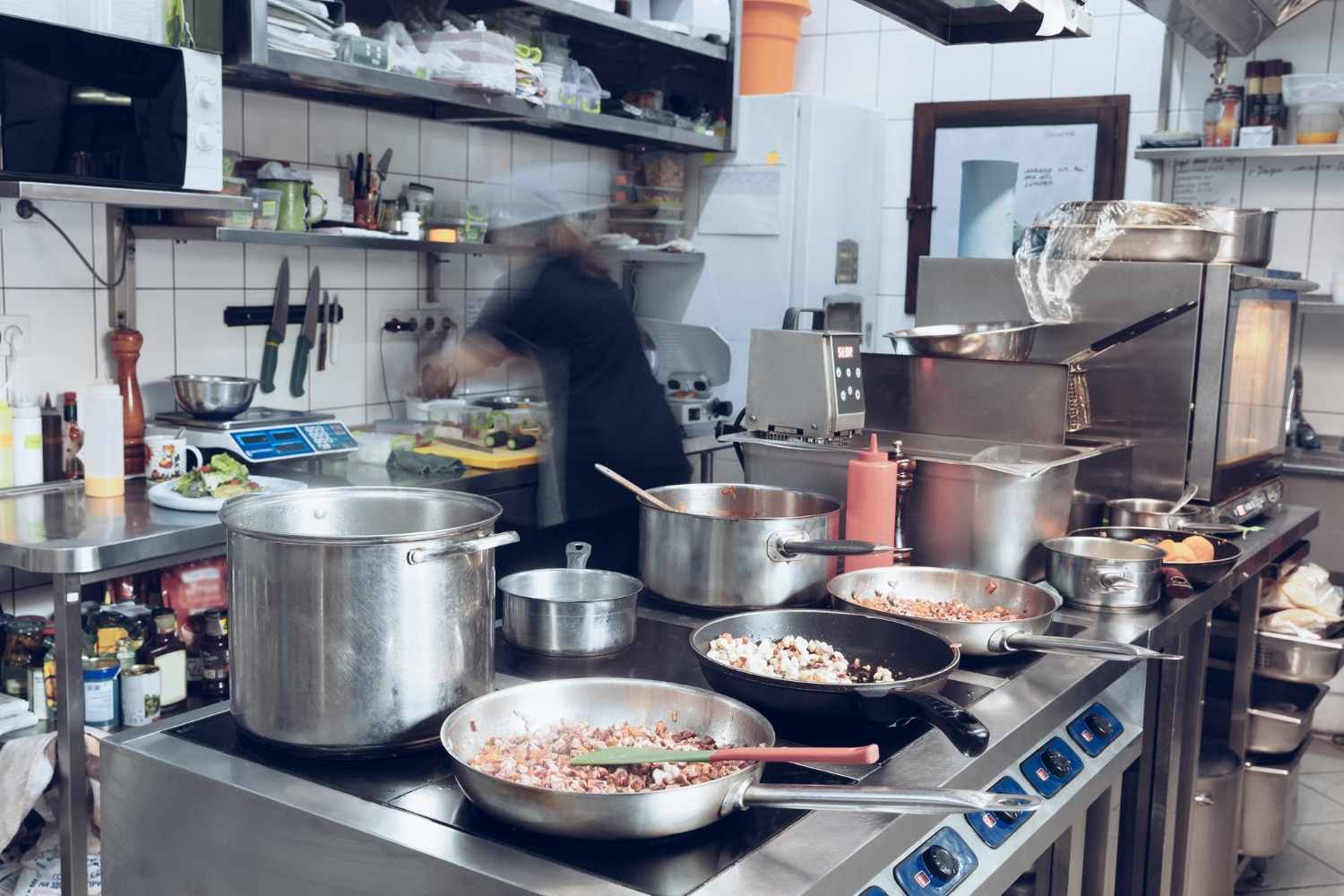
Russia Commercial Cooking Equipment Market is undergoing a significant transformation, with sustainability practices taking center stage. As global awareness of environmental issues rises, Russia hospitality industry is embracing eco-friendly solutions in order to meet both consumer demands and regulatory requirements. This shift is transforming how businesses approach their kitchen operations, from energy-efficient appliances to waste reduction strategies and the use of environmentally friendly materials.
In this article, we will explore the increasing focus on sustainability in Russia commercial cooking sector and the rising demand for green cooking solutions.
The Rise of Sustainability in Russia Commercial Cooking Sector
In recent years, sustainability has become more than just a buzzword in the global market. Governments, businesses, and consumers are all placing greater importance on reducing their environmental impact. In Russia, this trend is being seen in the commercial cooking industry, which includes restaurants, hotels, catering services, and other foodservice establishments. The push for eco-friendly commercial kitchen equipment is being driven by several key factors:
Environmental Concerns: Russia, like the rest of the world, is grappling with climate change, pollution, and resource depletion. The foodservice industry is a major contributor to carbon emissions, energy consumption, and waste production. As the public and businesses become more eco-conscious, there is a growing demand for sustainable practices across various sectors, including the commercial kitchen industry.
Government Regulations and Incentives: The Russia government has introduced several policies and initiatives to promote sustainability and energy efficiency in various industries. The foodservice sector is no exception, with regulations pushing for greener practices, including energy-efficient appliances and waste reduction measures. Businesses are also encouraged to adopt eco-friendly solutions through financial incentives, tax rebates, and other benefits.
Consumer Demand: Russia consumers, particularly younger generations, are becoming increasingly concerned about the environment. As people are more aware of the impact of their choices, they are demanding that the businesses they support adopt eco-friendly practices. This trend is evident in the foodservice sector, where consumers are increasingly looking for restaurants and food providers that demonstrate a commitment to sustainability.
Cost Efficiency: Sustainability and energy efficiency not only benefit the environment but can also reduce operating costs. Energy-efficient appliances, waste management systems, and water-saving devices help reduce utility bills. With rising energy costs and increased competition in the foodservice industry, businesses are adopting these practices as a way to cut costs and improve profitability.
Sustainable Commercial Kitchens in Russia: Key Trends
As sustainability continues to play a significant role in Russia commercial kitchen industry, several trends have emerged. These trends reflect the growing demand for green cooking solutions and sustainable commercial kitchen equipment. Let’s take a closer look at some of the most prominent developments in Russia commercial cooking sector.
1. Energy-Efficient Commercial Cooking Equipment
One of the most significant shifts in the Russia commercial cooking equipment market is the growing demand for energy-efficient appliances. Energy-efficient cooking equipment, such as ovens, stoves, dishwashers, and refrigeration units, is crucial in reducing both energy consumption and operating costs.
Key Examples of Energy-Efficient Equipment:
Induction Cookers: Induction cooking technology has been gaining traction in Russia commercial kitchens due to its efficiency and speed. Induction cookers use electromagnetic energy to directly heat the cookware, resulting in less heat loss compared to traditional gas or electric cooking methods. This reduces energy usage and ensures a faster cooking process.
Convection Ovens: These ovens use fans to circulate hot air, resulting in more even cooking and quicker cooking times. By reducing cooking times, convection ovens help commercial kitchens save on energy consumption while maintaining high-quality results.
Energy Star Rated Appliances: Many manufacturers in Russia are now offering commercial kitchen equipment with Energy Star ratings, a certification that signifies the appliance meets strict energy efficiency standards. These appliances use less electricity, which helps lower utility bills and reduces the kitchen's carbon footprint.
2. Eco-Friendly Kitchen Equipment
Beyond energy efficiency, there is a growing focus on using eco-friendly materials in commercial kitchen equipment. Many manufacturers in Russia are developing products made from sustainable materials that are either recyclable or have a smaller environmental impact compared to traditional materials. These eco-friendly options contribute to a circular economy where resources are reused and waste is minimized.
Examples of Eco-Friendly Commercial Kitchen Equipment:
Sustainable Cookware: Stainless steel cookware is common in commercial kitchens because it is durable, easy to clean, and recyclable. Manufacturers are increasingly offering cookware made from recycled materials, reducing the need for virgin resources.
Recyclable Food Storage Containers: The use of biodegradable and recyclable food storage containers is gaining popularity in Russia commercial kitchens. These containers help reduce the amount of plastic waste generated by foodservice establishments.
Sustainable Utensils and Tools: Eco-friendly utensils, such as knives, spoons, and spatulas made from bamboo, recycled plastics, or other sustainable materials, are becoming more common in commercial kitchens. These alternatives reduce plastic waste and contribute to a greener operation.
3. Waste Reduction and Management Solutions
Waste reduction is a major concern for commercial kitchens, especially in foodservice businesses that generate large amounts of organic waste and packaging materials. In Russia, many foodservice providers are investing in systems designed to minimize waste and improve overall waste management.
Waste Reduction Strategies in Russia Commercial Kitchens:
Composting Systems: Composting organic waste, such as food scraps, can significantly reduce the amount of waste sent to landfills. Several Russia restaurants and hotels are implementing composting systems in their kitchens to divert food waste from landfills and create valuable compost that can be used for landscaping or farming.
Waste Sorting Stations: Commercial kitchens in Russia are increasingly adopting waste sorting systems to separate recyclable materials (such as paper, glass, and plastic) from non-recyclables. This helps ensure that waste is disposed of in an environmentally responsible manner and that materials are sent to the appropriate recycling facilities.
Waste-Reducing Cooking Techniques: Russia chefs and kitchen operators are also adopting cooking techniques that reduce waste, such as using every part of a vegetable or animal (nose-to-tail or root-to-leaf cooking) and implementing portion control to prevent overproduction of food.
4. Water-Saving Solutions in Commercial Kitchens
Water conservation is another area where Russia commercial kitchens are focusing on sustainability. With increasing pressure on water resources, businesses are adopting water-saving solutions to minimize their usage while still maintaining high hygiene standards and operational efficiency.
Water-Saving Technologies in Commercial Kitchens:
Low-Flow Dishwashers: Dishwashers are a major source of water consumption in commercial kitchens. Low-flow dishwashers that use less water per cycle are becoming more common in Russia foodservice establishments.
Water-Efficient Faucets: Installing faucets that limit water flow or use motion sensors to reduce water wastage is another way Russia commercial kitchens are cutting down on water usage. These faucets help conserve water without compromising performance or cleanliness.
Efficient Water Filtration Systems: In some Russia kitchens, water filtration systems that use less water and are more energy-efficient are being integrated into operations. These systems not only reduce water waste but also improve the overall quality of water used in cooking and food preparation.
5. Eco-Friendly Energy Sources
In line with the push for energy efficiency, some foodservice businesses in Russia are exploring renewable energy sources to power their commercial kitchens. Solar panels, wind turbines, and other forms of renewable energy are increasingly being integrated into kitchen operations to reduce reliance on non-renewable energy and further decrease carbon emissions.
Solar-Powered Commercial Kitchens: A few forward-thinking restaurants and hotels in Russia are utilizing solar power to generate electricity for their kitchens. Solar panels installed on rooftops can help power cooking equipment, lighting, and refrigeration units, thus reducing the kitchen’s carbon footprint.
Biogas and Biomass Solutions: The use of biogas produced from organic waste is another potential energy solution for commercial kitchens. This renewable energy source can be used to generate electricity or heat, offering a sustainable alternative to conventional energy sources.
Conclusion: The Future of Sustainable Commercial Kitchens in Russia
The commercial cooking equipment market in Russia is clearly evolving toward sustainability. As the demand for eco-friendly kitchen equipment, energy-saving appliances, and waste reduction solutions grows, foodservice businesses are making significant strides toward reducing their environmental impact. By adopting energy-efficient technologies, using eco-friendly materials, implementing waste reduction strategies, and exploring alternative energy sources, Russia kitchens are leading the way in promoting sustainability.











Write a comment ...